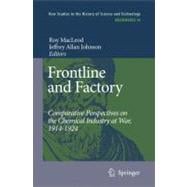
| Technological mobilization and munitions production : comparative perspectives on Germany and Austria | p. 1 |
| Mobilization and industrial policy : chemicals and pharmaceuticals in the French war effort | p. 21 |
| First World War explosives manufacture : the British experience | p. 31 |
| Transforming a village into an industrial town : the royal Prussian powder plant in Kirchmoser (Brandenburg) | p. 47 |
| Wartime chemistry in Italy : industry, the military, and the professors | p. 61 |
| Munitions, the military, and chemistry in Russia | p. 75 |
| Technical expertise and U.S. mobilization, 1917-18 : high explosives and war gases | p. 103 |
| Operating on several fronts : the trans-national activities of Royal Dutch/Shell, 1914-1918 | p. 123 |
| Kuhlmann at war, 1914-1924 | p. 145 |
| Organizing for total war : DuPont and smokeless powder in World War I | p. 167 |
| Science and the military : the Kaiser Wilhelm Foundation for military-technical science | p. 179 |
| Managing chemical expertise : the laboratories of the French artillery and the Service des Poudres | p. 203 |
| The war the victors lost : the dilemmas of chemical disarmament, 1919-1926 | p. 221 |
| Table of Contents provided by Blackwell. All Rights Reserved. |
The New copy of this book will include any supplemental materials advertised. Please check the title of the book to determine if it should include any access cards, study guides, lab manuals, CDs, etc.
The Used, Rental and eBook copies of this book are not guaranteed to include any supplemental materials. Typically, only the book itself is included. This is true even if the title states it includes any access cards, study guides, lab manuals, CDs, etc.